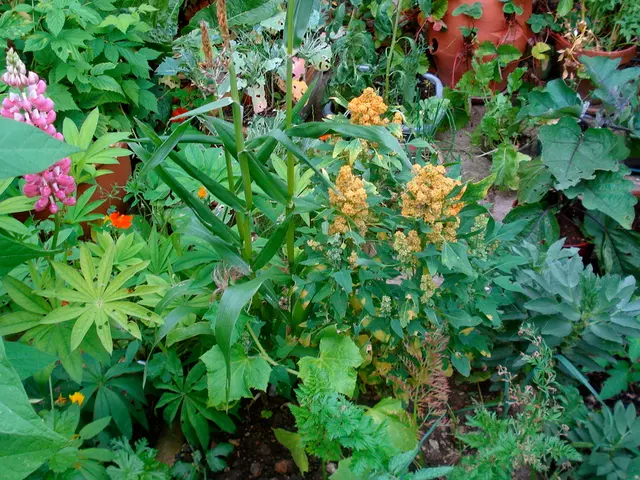Cultivating gardens and Alzheimer's treatment: Brain maintenance connections
Gardening, whether it's done at home or in an assisted living community, has proven to offer numerous benefits for mind, body, and spirit. A growing number of researchers and therapists have discovered that working with plants can positively impact physical and mental health.
According to the World Health Organization, around 50 million people worldwide are living with Alzheimer's disease or a related form of dementia. In the U.S., an estimated 5.5 million people of all ages are diagnosed with Alzheimer's disease, making it the sixth-leading cause of death in the country, killing more individuals than breast cancer and prostate cancer combined.
Studies reveal that daily gardening significantly reduces the risk of dementia and Alzheimer's disease as people age. A study showed a reduction in the risk of cognitive decline by up to 36%. According to the National Library of Medicine, participants in this study exhibited significantly increased levels of brain nerve growth factors BDNF and PDGF after performing 20-minute gardening activities with low to moderate intensity (1).
The therapeutic benefits of gardening for individuals with Alzheimer's have been extensively documented. In sensory gardens for people with Alzheimer's, many studies have shown improved behavior, reduced depression, enhanced cognition, and an overall improved quality of life. The National Library of Medicine released a study in 2021 demonstrating that therapeutic gardens in care environments positively affected agitation, behavior, walking, stress levels, self-esteem, depression, and aggressiveness (2).
Gardening offers a restorative effect on both the body and mind, improving the overall well-being of individuals with Alzheimer's. It serves as a source of exercise, promoting physical activity, boosting mood, and reducing stress levels. Engaging with nature, the soil, plants, and the sensory elements of a garden can bring a sense of calm, alleviate anxiety, and encourage positive interactions for people with Alzheimer's.
For individuals wishing to start gardening with someone living with Alzheimer's, the following tips can facilitate a positive experience:
- Simple Garden: A garden does not need to be intricate or large. Choose easy-to-grow plants that require minimal maintenance, such as herbs, tomatoes, or flowers. Planting in container gardens, raised beds, or grow bags will create an even easier-to-manage environment than traditional garden beds.
- Create a Safe Environment: Ensure the garden environment is safe and comfortable, removing any hazardous materials like sharp tools or chemicals and making pathways clear and easy to navigate. Consider a wheelchair or walker-friendly design for increased accessibility.
- Sensory Experience: Engage the senses with fragrant flowers and herbs, calming sounds, vivid colors, and textures to create a stimulating and soothing garden. Encourage your loved one to touch, smell, and taste the plants.
- Involvement: Encourage individuals with Alzheimer's to participate in the gardening process and help with tasks like planting, watering, and harvesting.
- Therapy: Consider working with a horticultural therapist to create a tailored gardening program for someone struggling with dementia.
- Social Space: Involve family and friends in the gardening process, or join a local gardening club or community garden to promote social interaction and a sense of community.
The team at Gardenuity aims to make gardens and gardening experiences accessible to everyone, wherever they live, work, and play. By choosing Gardenuity, you not only improve your personal well-being but also contribute to a healthier planet. Cultivating and nurturing your garden fosters a meaningful connection to nature, promotes good habits, and serves as a constant reminder of the beauty and wonder of the changing seasons.
Sources:(1) National Library of Medicine: Participants in the present study exhibited significantly increased levels of the brain nerve growth factors BDNF and PDGF by performing 20-min gardening activities with low to moderate intensity.(2) National Library of Medicine: Therapeutic gardens in care environments have positive effects on agitation, behavior, walking, stress levels, self-esteem, depression, and aggressiveness.(3) Mayo Clinic: Dementia vs. Alzheimer's: Key differences.(4) Alzheimer's Association: What are the stages of Alzheimer's?
- Gardening, particularly focusing on sensory gardens, has been found to have a positive impact on individuals with Alzheimer's, improving behavior, reducing depression, and enhancing cognition (1, 2).
- Engaging in home-and-garden activities like gardening can contribute significantly to mental health, as studies suggest a reduction in the risk of dementia and Alzheimer's disease by up to 36% (1).
- The science behind gardening's benefits for mental health is well-documented, with daily gardening activities shown to boost mood and reduce stress levels (1).
- Incorporating gardening into a health-and-wellness routine can be beneficial for both physical and mental health, making it an important aspect of a holistic lifestyle (2).







